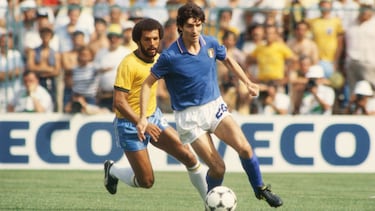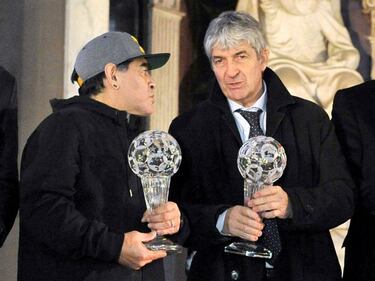Paolo Rossi and six goals for eternity
The 1982 World Cup in Spain appeared to be a stage set for Diego Maradona to shine but the quiet efficiency of Paolo Rossi guided Italy to the title.

The 1982 World Cup in Spain seemed set for Diego Maradona, recently signed by Barcelona, to be anointed on the greatest stage of all but a certain Paolo Rossi stole the show instead. Until then the Italy striker was hardly a household name. He was known to football fans who studied the wider game as a slippery striker who had a habit of appearing in the area when and where he was least expected to deliver goals of singular cunning. One of the good players of the era, little more, with a past somewhat sullied by a two-year ban for his alleged involvement in the Totonero match-fixing scandal, one of the most notorious in Italian football history in which numerous clubs and players were caught up.
Related stories
But Rossi rose from the ashes of the Totonero scandal just in time for the 1982 World Cup. Enzo Bearzot, a man of wisdom with a pipe permanently in his hand, had unshakeable faith in Rossi and installed him as his undroppable centre forward. Rossi failed to score in the group stage, which Italy negotiated by a miracle without winning a game. Rossi also drew a blank in the first game of the second group phase against Argentina, which Italy won 2-1. But from there everything he touched turned to gold. He scored a hat-trick against Brazil, the tournament favourites and the side the public at large wanted to win. He then plundered both goals against Poland in a 2-0 win in the semi-finals and the opener in the final against West Germany, which Alfredo Di Stéfano always said was worth three.
Maradona and Rossi

Rossi fired Italy to the 1982 World Cup, leaving Maradona to wait for the next one. Now Maradona has gone, followed too swiftly by Rossi, whose memory remains imprinted by those few days when he seemed capable of curing the sick with a simple touch. I met him in Italy in 1990, under amusing circumstances. He was working in advertising and was looking for contacts at Canal +. He appeared in a nightclub where he assumed we were having a party to celebrate our departure. But we were celebrating because we had received a two-month extension to our stay from the government! “It’s because of things like this that I feel as much at home in Spain as in Italy,” he told me with a chuckle.
